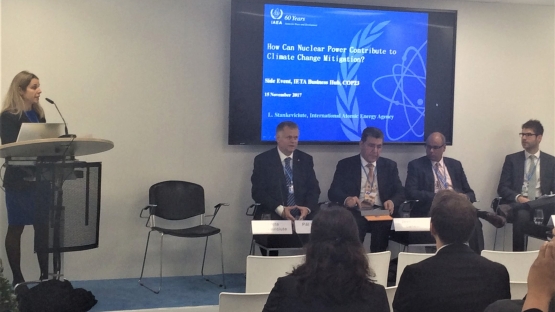The challenges and opportunities for nuclear power to continue to provide low carbon energy in the future was the focus of a side event held at the COP23 Bonn Climate Change Conference.
Hosted and moderated by the IAEA, the side event “How Nuclear Power Can Contribute to Climate Change Mitigation?” underscored the global role that nuclear energy plays in addressing climate change and featured specific initiatives underway in France, Hungary, and the United Kingdom. Senior government officials and experts at the side event described country actions and drivers behind future nuclear power development.
Nuclear power is expected to be an indispensable part of the reliable, low cost and low carbon power supply needed to meet the Paris Agreement goal of keeping the rise of global temperature below 2°C. Nuclear power today provides a third of global low carbon electricity generation.
However, for nuclear power to step up to the Paris Agreement goals, construction rates of new nuclear reactors will need to double by 2030 from the rate seen in 2015-2016, according to Peter Janoska, an analyst with the International Energy Agency (IEA).
“Low carbon electricity is key,” said Jean-Yves Caneill, a Climate Policy Consultant in France. “Electricity will help to decarbonize many sectors of the economy. It is crucial that all low carbon technologies including nuclear are used appropriately depending on national circumstances.”
Some countries already use a significant share of nuclear power and plan to build more. Hungary’s four nuclear reactors generate over one third of the country’s electricity, with two new units planned.
Pal Kovacs, Head of Cabinet of Hungary’s Minister responsible of the Paks Nuclear Power Plant expansion, said that nuclear power generation was a more mature option for Hungary. “Technologically, it has a strong potential in the future,” he said. “New, safer and more economical nuclear reactors could lead us to a clean and sustainable future.”
Nuclear power is among the lowest cost electricity generation technologies, once in operation. However, the cost of the ultimate price of electricity depends on market structure and competition. New financing mechanisms, such as Contracts for Difference used for the UK Hinkley Point C nuclear power station, guarantee returns while sharing project risks.
“I believe nuclear power has an important and continuing role to play in reducing carbon intensity in the power generation sector in the UK, while contributing to security of supply,” said Anurag Gupta, Director of KPMG in the United Kingdom. “The key challenge facing the sector in achieving this goal is ensuring the delivery of cost competitive projects, on time and on budget.”
The experts emphasized that with the right support nuclear power can provide affordable, reliable and low carbon electricity for development.
The IAEA led a series of side events at the COP23, held from 6 to 17 November in Bonn, Germany.
Electricity will help to decarbonize many sectors of the economy. It is crucial that all low carbon technologies including nuclear are used appropriately depending on national circumstances.





